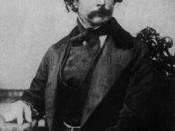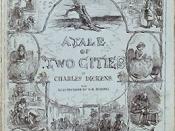Peasants Easily Survive the Elements: A Tale of Two Cities Analytical EssayDuring the time of the ancient Greeks, when modern sciences did not exist, the four elements; earth, wind, fire, and water; determined the structure and beliefs of society. The Greeks personified the elements, transforming them into gods, and thus instilling a lasting history of the elements upon the world. Throughout A Tale of Two Cities, France's third estate, the peasant class, wreaks havoc upon the land, adopting the responsibility of the elements. Charles Dickens revives this personification of the elements in his novel, as earth, wind, fire, and water converge to form powerful metaphors, effectively portraying the peasants: fire consumes; water engulfs; wind roars; and earth groans as the novel progresses.
Dickens uses clusters of images to describe the French peasants as a frenzied mob, increasing the tension between them and the nobles. "Suddenly the sea rose immeasurably wider and higher, and swept Defarge over the lowered drawbridgeâ¦" (I:5) He paints a picture of the earth, wind, fire, and water as the third estate by careful genesis of the four elements, heightened fervor, clever literary devices, and finally completed personification at the climax of the novel.
The origin of this metaphor begins in "Book One," as the author introduces the first puzzle pieces.
Charles Dickens shows his literary genius when he first mentions the elements, because major plot events take place at the same time, distracting the reader's attention from the metaphor. In Chapter Two, "The Mail," the Dover mail carriage represents the third estate (horses) pulling the nobles (drivers) up a muddy hill. Along with this ingenious metaphor, the nobles and their coach slowly mire in the mud, much like the situation in France. Dickens mentions earth first; fire comes next.
"The obscurity was so difficult to penetrate...



Very nice
This was an exceptional essay. The author uses vivid language and uses in-text citation which is very convenient. This essay goes far beyond a superficial synopsis and delves into the heart of novel.
3 out of 3 people found this comment useful.